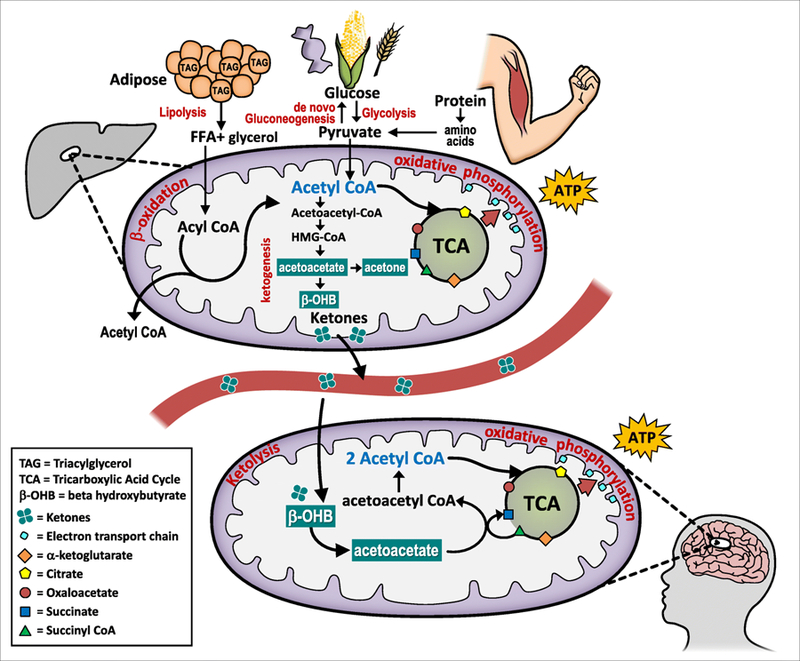Ketogenic Diet and Parkinson’s disease

Author: PhD Andreia Torres
Parkinson’s disease (PD) is a chronic neurodegenerative disease, affecting 1% of the world population over 60 years of age. It is associated with destruction of dopaminergic neurons and progressive loss of mobility and cognitive impairment. The causes of the disease remain unknown, but a multifactorial pathogenesis, including mitochondrial dysfunction, abnormal glucose metabolism in the brain, or inflammation within the nervous system, is indicated.
Mild cognitive impairment is present in 20%–33% of people with newly diagnosed PD. Furthermore, 60%–80% of patients with PD and MCI develop dementia over the next 12 years. As 50%–80% of PD patients are simultaneously diagnosed with impaired carbohydrate metabolism the ketogenic diet is advised to all patients, as nutritional ketosis enhances cognitive performance [1].
Nutritional ketosis
Nutritional ketosis can be defined as the intentional restriction of dietary carbohydrate intake to accelerate the production of ketones and induce a metabolic effect that stabilizes blood sugar, minimizes insulin release, and thereby mitigates the negative effects of longstanding insulin resistance [2].

Image source: Gershuni, Yan, & Medici, 2018
Ketogenesis, the production of ketones for fuel, is a normal, physiologic process that occurs via hepatic beta-oxidation of free fatty acids in the mitochondria of liver cells. Energy stored as fat in adipose tissue is liberated to acetyl-CoA and converted to ketones. Extra-hepatic tissues are able to undergo ketolysis and convert ketones back to acetyl-CoA which enters the TCA cycle and is used by the mitochondria to generate ATP for energy. It is a great source of energy for the brain [2].
Ketones and Parkinson’s
Current forms of therapy, such as the use of the drug L-DOPA, can prevent the onset of motor dysfunction but do not affect other cognitive functions [3]. A study published in 2022 evaluated the impact of a KD on Parkinson’s disease (PD) symptoms, depression, anxiety and biomarkers in adults with PD. At the time, 16 adults aged between 36-80 years with PD went on a KD for 12 weeks in a single-arm trial. Weight, waist circumference, HbA1c and fasting insulin improved. Anxiety and part 1 of the United Parkinson’s Disease Rating Scale (UPDRS) improved; depression [4].
Regarding other aspects associated with PD, animal studies demonstrated promising results, with improvements in locomotor activity, dopaminergic activity, redox status, and inflammatory markers [5]. Human clinical trials show heterogeneous outcomes, and we believe that timing is crucial and that adults should take care of their brains as soon as possible, not waiting for the worst to come.
Exogenous ketones and Parkinson’s didease
A study in a mice model showed that a BHB supplement is beneficial, reversing motor deficits, loss of dopaminergic neurons, and glial cell activation. BHB prevented microglia pyroptosis (a highly inflammatory form of lytic programmed cell death) via the NLRP3 inflammasome, resulting in downregulation of proinflammatory cytokines IL-1β and IL-18. You can find BeKeto exogenous ketones here.
Bibliography:
[1] Krikorian R, Shidler MD, Summer SS, Sullivan PG, Duker AP, Isaacson RS, Espay AJ. Nutritional ketosis for mild cognitive impairment in Parkinson’s disease: A controlled pilot trial. Clin Park Relat Disord. 2019 Aug 6;1:41-47. doi: 10.1016/j.prdoa.2019.07.006. PMID: 34316598; PMCID: PMC8288565.
[2] Gershuni VM, Yan SL, Medici V. Nutritional Ketosis for Weight Management and Reversal of Metabolic Syndrome. Curr Nutr Rep. 2018 Sep;7(3):97-106. doi: 10.1007/s13668-018-0235-0. PMID: 30128963; PMCID: PMC6472268.
[3] Phillips MCL, Murtagh DKJ, Gilbertson LJ, Asztely FJS, Lynch CDP. Low-fat versus ketogenic diet in Parkinson’s disease: A pilot randomized controlled trial. Mov Disord. 2018 Aug;33(8):1306-1314. doi: 10.1002/mds.27390. Epub 2018 Aug 11. Erratum in: Mov Disord. 2019 Jan;34(1):157. PMID: 30098269; PMCID: PMC6175383.
[4] Tidman MM, White D, White T. Effects of a low carbohydrate/healthy fat/ketogenic diet on biomarkers of health and symptoms, anxiety and depression in Parkinson’s disease: a pilot study. Neurodegener Dis Manag. 2022 Apr;12(2):57-66. doi: 10.2217/nmt-2021-0033. Epub 2022 Feb 18. PMID: 35179078.
[5] Grammatikopoulou MG, Tousinas G, Balodimou C, Anastasilakis DA, Gkiouras K, Dardiotis E, Evangeliou AE, Bogdanos DP, Goulis DG. Ketogenic therapy for Parkinson’s disease: A systematic review and synthesis without meta-analysis of animal and human trials. Maturitas. 2022 Sep;163:46-61. doi: 10.1016/j.maturitas.2022.06.001. Epub 2022 Jun 9. PMID: 35714419.


